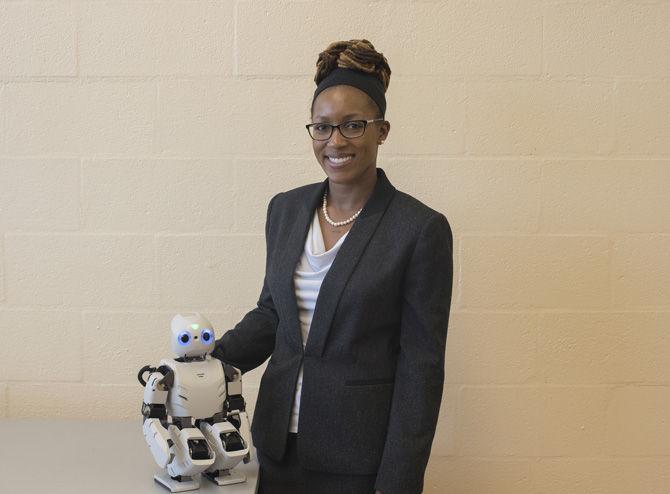Electrical engineering assistant professor LaVonda Brown is bringing a human touch to the field of robotics.
Brown, who joined the electrical engineering faculty in January, is researching ways to leverage robots and other health care technologies to improve people’s quality of life. Though Brown has aspirations to be a leader in the field, she said her route to health care robotics wasn’t always obvious.
Brown said as an undergraduate she knew she didn’t fit the stereotypical profile of an electrical engineer. She was outgoing, wanted to work on interdisciplinary teams and wanted to see her work make an impact in people’s lives in real time.
The marriage of her personality and research interests brought her to the realm of human-robot interactions. First, as a Ph.D. candidate, she researched utilizing a Robotis Darwin humanoid robot as an educational tutor for math, and the interactive technology eventually led her to a focus in health care robotics.
Brown said her work allows her to positively impact people’s lives and pay forward the support and assistance she’s received throughout her life.
“It gives me purpose,” Brown said. “It makes me wake up and want to come to work every morning, just knowing that somebody is going to benefit from this and I can improve their quality of life.”
Brown’s research has focused on programming Darwin robots to serve as therapists for children with motor-skills disorders like cerebral palsy. Brown said the robots can be programmed to assist patients in physical therapy exercises by offering instruction, encouragement and performance feedback.
In some cases, robots may be viable alternatives to human therapists, Brown said. The need for assistance for children with motor-skills disorders currently outpaces the number of therapists available. Robots could provide patients with the daily physical therapy assistance they need while alleviating the load for families and therapists alike, she said.
Brown’s research interests also extend beyond robotic platforms.
Brown is currently collaborating with Emory University’s Alzheimer’s Disease Research Center to develop low cost eye-tracking technology that can contribute to the detection of early onset Alzheimer’s Disease. Brown said the longitudinal study is entering its second year and new data is being collected weekly.
Brown said she designed the program as a multi-camera system that monitors eye gaze as subjects interface with a series of images. The cameras track the movement of the subject’s eyes as they scan the screen, and the results are analyzed to determine if trends exist for people with cognitive impairments and disorders, she said.
The assumption is that people with cognitive impairments will scan the images differently when viewing repeated images than someone with good memory. If the study is successful, Brown and her fellow researchers plan to scale the technology down into a mobile version, hopefully an app, that would utilize cell phone cameras to test for Alzheimer’s and similar disorders.
Electrical and computer engineering division chairman Jerry Trahan said Brown’s work adds valuable expertise to the college. Innovation in health care robotics and instrumentation is growing in demand nationally as the need for improvements to health care systems and delivery grows, he said.
Brown’s research and knowledge of robotics builds on the College of Engineering’s growing health care focus. In the classroom, Brown’s background helps her expose students to the more tangible, hands-on perspective of what’s possible in electrical engineering, Trahan said. Having a new take on the field could help motivate and inspire students, he said.
Brown said she hopes to heavily involve students in her lab and research efforts. She’s interested in a diverse range of issues, and having a variety of perspectives helps bring new and valuable ideas to the table. She wants the students to have an equal hand in the research, and for her lab to operate as a team.
In the future, Brown hopes to continue diversifying her research, possibly researching obesity. There’s no set plan now, but Brown said she’s going to follow her passions.
“I want to be involved in things I’m genuinely passionate about. That’s what makes the research successful,” she said.
Electrical engineering professor researches ways to use robotics to improve quality of life
March 30, 2017
Assistant Professor LaVonda Brown rests her hand on the robot Darwin on March 29, 2017 in the Electrical Engineering Building.
More to Discover








